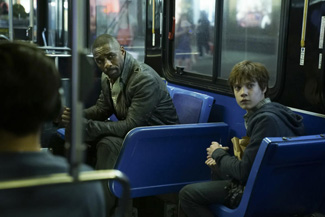|
|
Movie Review: The Dark TowerBy Ben GruchowAugust 10, 2017
Elba is the only thing that really holds the film together in its final half; the actor has a way with projecting gravity and truth through even the silliest dialogue, and even as I find myself struggling to remember any one sentence spoken in the film, it’s not at all difficult to bring to mind a clear image of Elba’s haunted and intent expressiveness as the lone gunslinger. It makes the whole thing a little bit more infuriating; this incarnation of the character deserves a movie worthy of the actor’s effort. McConaughey, too, is effective as the film’s antagonist, giving life to an idiot-frequency screenplay with intonation and hints of malicious glee. Taylor is less sure of himself, only intermittently able to give weight to a thinly-drawn audience surrogate. Even so, not Elba nor McConaughey nor Taylor can do anything with the film’s ruinous final minutes, which play like a performer realizing only at the last second that they’ve reached the end of their allotted time, and hurriedly slapping some kind of conclusion onto their act so that the curtain doesn’t fall on them. There certainly isn’t any defense from a narrative or adaptation or character perspective for the way this story ultimately concludes. Have you ever anticipated something so much that you dream about it, and the dream version of that thing contains lots of little key identifiers that make it sort of recognizable, while the major components are twisted around and off-base and somehow wrong? To watch The Dark Tower is to experience that in waking. It’s uncanny in that regard; hours after seeing it, I had the strange feeling that I had experienced the totality of the Dark Tower series in movie form even as all the specifics were rapidly fading. This may sound like some sort of compliment to efficiency or tone; I assure you it is not. When a franchise starter we anticipate swings and connects, we feel energized by it: we feel a little bit more empty because there’s nothing quite yet to replace the anticipation we were cultivating, but we sense the promise and potential in a universe being expanded by a sure hand, and in the meantime we can’t wait to see it again and introduce newcomers to it. With The Dark Tower, all we get is the emptiness. 3.8 out of 19.
|

|
|
|

|
Friday, November 1, 2024
© 2024 Box Office Prophets, a division of One Of Us, Inc.


